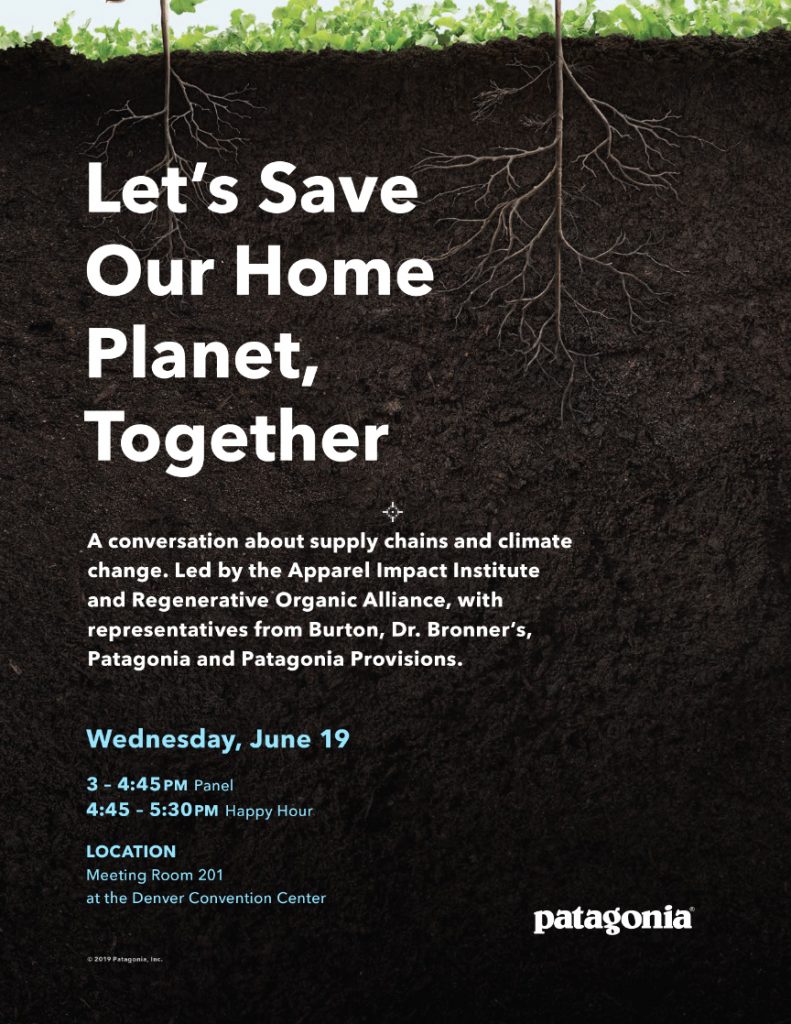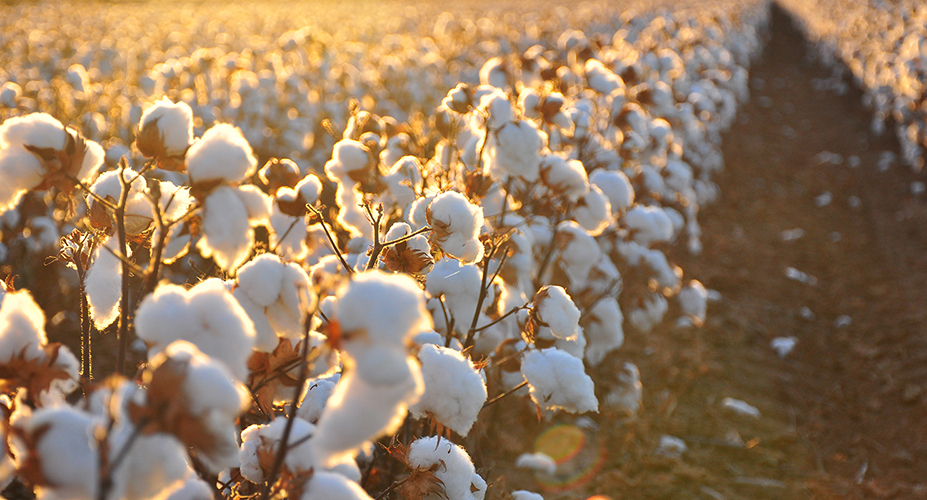 Day Two of Outdoor Retailer, Patagonia will lead a conversation about supply chains and climate change led by the leaders of the Apparel Impact Institute and Regenerative Organic Alliance including representatives from Burton, Dr. Bronner’s, Patagonia and Patagonia Provisions, the flyer is shown left.
Day Two of Outdoor Retailer, Patagonia will lead a conversation about supply chains and climate change led by the leaders of the Apparel Impact Institute and Regenerative Organic Alliance including representatives from Burton, Dr. Bronner’s, Patagonia and Patagonia Provisions, the flyer is shown left.
Join them from 3:00 – 5:30 p.m. in Meeting Room 201 at the Denver Convention Center.
•••
<span style="color: #999999;">This OR Show, Patagonia will showcase a collection of Men’s and Women’s tees and shorts as part of a test to grow cotton with more than 150 small-scale farms working toward Regenerative Organic Certification—because healthy soil traps carbon and the growing movement Patagonia is spearheading, could help stop or slow climate change.
Agriculture that is dependent on chemical and/or industrial techniques is terrible for the health of farmworkers and for the planet—contributing up to one-quarter of annual global emissions. If we switch from traditional chemical farming to organic and low, no-till practices, Patagonia believes we could rebuild healthy soil and draw carbon back into the ground—which could be a solution to the climate crisis, among other important benefits.
<span style="color: #999999;">While cotton is the world’s most popular natural fiber, only one half of one percent is organic. For the past 21 years, Patagonia has used only organic cotton in the brand’s clothing production where cotton is present and knows firsthand how hard it is for farmers to transition from conventional to organic cotton.
To help increase supply for organic cotton, Patagonia is lending support to farmers on this journey. There are three steps in their cotton journey.
- Cotton in Conversion: farmed organically, but not yet certified organic. Transitioning conventional cotton to organic cotton is the first step. Patagonia supports farmers by funding the three-year transition to certified organic cotton and purchasing their cotton during the transition.
- Certified Organic Cotton: employs nature-based solutions to build healthy soil. Organically farmed cotton uses nature-based solutions to manage pests and build healthy soil whereas chemical farming practices allow the use of synthetic fertilizers, pesticides, herbicides, irradiation, and genetic engineering for pest or weed control, to improve resistance to pests or disease, or to improve crop yields at the expense of farmworker health and the planet.
- Regenerative Organic Certification (ROC) Pilot Cotton: builds healthy soil, traps carbon and helps stop climate change. Patagonia is working with suppliers in India to pilot the first regenerative organic cotton trials. This collection is part of a test to grow cotton on farms working toward ROC. The organic cotton in this seasons tees and shorts is from farms working toward the highest standard, which aims to rehabilitate soil, respect animal welfare and improve the lives of farmers.
Patagonia believes that traditional, chemical agriculture depletes carbon from the soil and turns it into plain old dirt. Regenerative organic agriculture practices like crop rotations and cover cropping could reverse and trap carbon.
What is Regenerative Organic Certification (ROC)?
ROC is a certification encompassing pasture-based animal welfare, fairness for farmers and workers, and robust requirements for soil health and land management.
- Soil Health – increase organic matter over time and sequester carbon in the soil.
- Animal Welfare – Improve animal welfare.
- Social Fairness – Provide economic stability and fairness for farmers, ranchers, and workers.
It was developed by the Regenerative Organic Alliance which was created by a coalition of like-minded farmers, ranchers, brands, non-profits, and other organizations who believed in the need for an all-encompassing regenerative certification, including Patagonia, Dr. Bronner’s and the Rodale Institute.
NSF International is the oversight body and scheme manager for the ROC program. 19 companies including Patagonia and Patagonia Provisions are part of the pilot. More than 80 companies applied.











